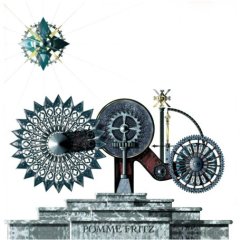The Orb reissues:
Pomme Fritz
Orbvs Terrarvm
Orblivion
Cydonia
Like a huge ever growing pulsating brain that ruled from the centre of the rave world, throughout the 90s The Orb simply plugged themselves into the dance music matrix and poured forth the choons. To be faced with these expanded reissues of the studio albums of their Island years is a little like returning to gushing teenage diaries – products of fevered imaginations, the albums are, with one exception, crazy long, and are now bolstered by a bunch of rare and unreleased remixes which, in true Orb fashion, give only vague indications of who did the remixes or what tracks they are versions of. In the era of precise, clinical and professional dance music, it’s like being faced with the ramblings of madmen.
There wasn’t much method, per se, in this madness. There was, however, an occult intuition to the way The Orb made music, as if they were mediums tentatively attempting to establish communication with ghosts, or the protagonists of Tarkovsky’s The Stalker, making tortuous, oblique progress through the unpredictable chaos of the zone. Alex Patterson and his revolving cast of collaborators were not so much musicians as editors, turning on the taps and letting flow torrents of dub, techno, rave and found sound.
Way beyond the hopeless ramblings of stoners, the strange sense of cosmic equilibrium in The Orb’s best work suggests they managed to smoke their way towards some sort of higher state. For brief moments in the 90s, when the heavens were in alignment, they channelled everything that was good in 90s music – remixology, sampledelia, drug epiphanies – into some of the weirdest music ever made.
These reissues pick up the story after their groundbreaking first two albums, The Orb’s Adventures Beyond The Ultraworld and UF Orb, and begin with the crucial juncture of Pomme Fritz. The Orb’s shortest album, it broke radically with their previous work by stripping back the cavernous reverb, replacing monolithic dubbiness with gossamer textures. It wrongfooted many diehard Orb fans used to the heady bongload rush of the group in their full psychedelic pomp, but Pomme Fritz is one of their greatest achievements, an ecstatic plateaux of airy sound, effortlessly lithe rhythm and cold, fresh spaces. The opening title track is like a lost Krautrock classic, with elliptical guitar and bass figures revolving in close, elegant, overlapping orbits. ‘We’re Pastie To Be Grill You’ is one of the strangest tracks in their whole oeuvre, using no beats or instruments, just cut-up and treated vocal sounds forming a disquieting piece of musique concrète. With no sense of linear pulse, just a ghostly chorus emerging through the ether, it’s the closest The Orb got to warping the spacetime continuum. Beats finally arrive with ‘Bang ‘Er ‘N’ Chips’, but they seem locked in a strange dimension, shuffling along like swamp creatures rather than breaking forth. The remixes here, including a typically fluid reinterpretation by Thomas Fehlmann, provide further genetic mutations of Pomme Fritz‘s strange lifeforms.
After this concise yet bewilderingly multi-layered statement, the topographically themed Orbvs Terrarvm was something of a letdown. There’s a majestic scale to dubbed out epics ‘Valley’ and ‘Plateaux’, but on the whole there’s a restraint to the album which makes it feel somewhat clinical. This was music for those who liked their head trips to be wholly predictable.
OrbvsTerrarvm saw The Orb regain their sense of cosmic irreverence, and its ‘remix’ of Jean-Michel Jarre’s ‘Oxygene’ as ‘Toxygene’ is freaky in all senses of the term. There was some success with introducing drum‘n’bass into The Orb’s sound, and the hustling chaos of the album was certainly potent, if lacking the celestial grace of earlier work.
By the stage of Cydonia, like Dennis Hopper and Peter Fonda in Easy Rider, the trip had become a bummer. Soft vocal tracks signalled the return of the conventional, with The Orb often a mere backing band to some fairly lame post-trip hop comedown music. Given the scale, ambition and sheer drugginess of their music, there was always a danger they were going to overdose on overload, and this was the fall out. For a brief cycle of albums, however, they managed to channel dance/drug music culture into the kind of multi-dimensional cosmic groove last seen with P-Funk, and Pomme Fritz stands as one of their crowning achievements.


